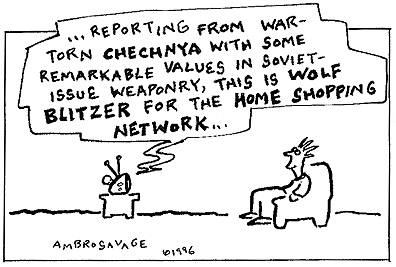
 FIRST WORD
FIRST WORD
IDEAS THAT
CUT THROUGH
THE BS
Public-Interest Journalism
It Needs a Democratic Funding Source
By Doug Collins
The Free Press
Occasionally when I'm looking for new distribution sites for the Free Press, I'll meet a Limbaughlike store manager who says to me, "No, we don't want to carry this paper. It's too political. It's too biased. We only carry entertainment papers here."
I'll reply, "It's investigative journalism, the kind that digs up facts rather than PR, the kind that showed Nixon was a crook."
"Exactly," says the smug manager, urging me toward the door.
I'm learning now to ignore these dittoheads, even secretly thank them. They're part of the reason why the Free Press and other public-interest media are getting stronger all the time.

The fact that the Free Press is a subscriber-driven publication is the reason that we can rake muck the way we do. Other local papers miss the important news stories we publish. It's not that they are stupid or careless. On the contrary, they are very smart at making money. It's just that most papers are usually dependent on advertisements for 80 percent or more of their revenue. Ads feed them, and they're smart enough not to bite the hand that feeds. So they tend not to print articles which seriously criticize tobacco advertisers, the holy Nordstrom company, or other moneyed elites.
Here's an ugly local example of how ad-dependence can destroy honest-to-goodness news. In the 1960s, a magazine called Seattle was started by KING broadcasting (no relation to a current magazine of the same name). The staff of Seattle were bright young journalists eager to make an investigative mark, doing what a lot of journalism students dream they could get paid for.
The magazine did fine for a brief time until it printed a story about county prosecutor Charles Carroll's suspicious monthly visits with crime figure Ben Cichy. The facts were well documented, but the story brought the paper to its demise. Major advertisers cancelled because of the story. KING finally dumped the pariah magazine. The moral of the story: it's hard to speak truth to power if you are also mostly bankrolled by power. At the Free Press we've chosen to take a safer route: we're mostly supported by you, the subscribing reader.
Most media hacks know the ropes better than a few idealistic young reporters at Seattle did. Seriously questioning the business or political elite means putting your job on the line. If you're working for an advertisement-driven paper, it's safer to write about fluff, and info-tainment, which is mostly what your editor assigns you anyway. And the cub reporter who's after a bright career will not just write for any reader with everyday problems; increasingly, news writing is geared toward people with money and power, for "people who buy," according to Emmett Murray, longtime local Newspaper Guild member and copy editor at the Seattle Times.
Mainstream news is already just another product marketed by megaconglomerates. The current head of the Times-Mirror corporation was previously an executive at the Pillsbury company, and doughboy reporters crawl over each other to scoop the latest OJ Simpson developments. The news business nowadays is as commercial and formulaic as Hollywood.
The problem with current American journalism is the same as the problem with our electoral system. They are both primarily supported by wealthy businesspeople. You'll rarely see advertisement-driven newspapers or lobby-driven politicians pay more than lip service to many popular economic or environmental causes. Right-wing political pundits like John Carlson can use well-funded think tanks and powerful patrons to dominate the radio waves, while progressives flail for lack of funding. What results is inverted truth: the problems of society aremore often blamed on the powerless. The best the nation is mustering politically are smiley-faced corporatists like Bill Clinton, versus sour-faced corporatists like Dole.
When wealthy bosses receive less media criticism, corruption and pollution will multiply. Kevin Phillips, author of The Politics of Rich and Poor, states that in history there typically is "a normal balance, where money buys favors, but it doesn't buy so much that it perverts the culture or the political system. But then you rise to certain points where it does, like the Guilded Age at the end of the 19th century, the Roaring Twenties, and then the last 15 years."
To help bring ourselves out of these Roaring Nineties before we crash, we at the Free Press are helping to forge a new type of journalism that is much more likely to be an agent of change for honest government, a fair workplace, and a nontoxic earth. This public-interest journalism will depend greatly on a democratic funding source: subscribers. If you like the paper, and you'd like it to have a larger public impact, please subscribe.
Currently the Free Press is undergoing a fund drive to become a monthly publication, rather than once every two months (see subscriptions). We hope you can support us to help bring progressive news to the public twice as often.
[Home]
[This Issue's Directory]
[WFP Index]
[WFP Back Issues]
[E-Mail WFP]
Contents on this page were published in the September/October, 1996 edition of the Washington Free
Press.
WFP, 1463 E. Republican #178, Seattle, WA -USA, 98112. -- WAfreepress@gmail.com
Copyright © 1996 WFP Collective, Inc.













